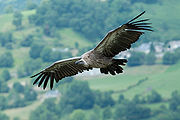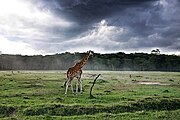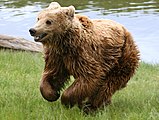Wildlife photography
This article needs additional citations for verification.(December 2009) (Learn how and when to remove this template message)
|
Wildlife photography is a genre of photography concerned with documenting various forms ofwildlife in their natural habitat. It is one of the more challenging forms of photography. As well as requiring sound technical skills, such as being able to expose correctly, wildlife photographers generally need good field craft skills. For example, some animals are difficult to approach and thus a knowledge of the animal's behavior is needed in order to be able to predict its actions. Photographing some species may require stalking skills or the use of a hide/blind for concealment.
While wildlife photographs can be taken using basic equipment, successful photography of some types of wildlife requires specialist equipment, such as macro lenses for insects, long focal length lenses for birds and underwater cameras for marine life. However, a great wildlife photograph can also be the result of being in the right place at the right time[1] and often involves a good understanding of animal behavior in order to anticipate interesting situations to capture in photography.
Contents
[hide]History[edit]
In the early days of photography, it was difficult to get a photograph of wildlife due to slow lensesand the low sensitivity of photographic media.[2] In fact, it was not until 1906 that National Geographic published its first wildlife photos.[3] The photos were taken by George Shiras III, a U.S. Representative from Pennsylvania. Some of his photos were taken with the first wire-tripped camera traps.[4]
Definition[edit]
The world's three largest photography organisations, the Photographic Society of America, theFédération Internationale de l'Art Photographique and the Royal Photographic Society have adopted a common definition for nature and wildlife photography to govern photography competitions, their respective presidents writing in a joint statement, "The development of a common definition for nature and wildlife photography will be an important step in helping photographers, many of whom enter competitions internationally, know what the rules are. It will also provide organisers with a very clear definition when they need to deal with the problem of ineligible images."[5]






















0 comments:
Post a Comment